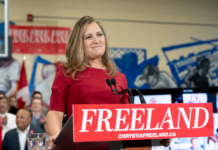The Trudeau government’s immigration policy is undermining Bank of Canada’s (BoC) attempts to wrest runaway inflation.
The central bank hiked its overnight rate to a 22-year high on Wednesday as it continues to try to meet its 2% inflation mandate by curtailing consumer spending.
While the BoC credits the surge of newcomers to help with labour shortages across the country, it states immigrants are adding to the demand for housing.
“Strong population growth from immigration is adding both demand and supply to the economy: newcomers are helping to ease the shortage of workers while also boosting consumer spending and adding to demand for housing,” wrote the central bank in a news release on Wednesday.
Housing remains chronically undersupplied as Canada grows at a record pace—1.05 million people entered the country in 2022, far and away above the 360,000 average since 1995—and it’s pushing mortgage rates, which factor prominently in inflation calculations, higher.
Chris Karram, managing partner at SafeBridge Private Wealth, echoed the central bank’s concerns saying that while immigration is crucial to the health of the Canadian economy, current policy is mismanaged.
Karram says runaway housing prices and rising mortgage rates may remove potential homebuyers from the market, but there are countless others with well-lined pockets ready to take their place.
“So the more people we let in without being strategic about how we let them in, how we build houses and provide the possibility of housing for purchase—or even just to rent, frankly—it causes a massive impact,” Karram said.
Sixty percent of newcomers under current immigration policy are skilled workers, meaning that many can afford housing prices upon arrival.
The impact that population growth-induced demand is having on supply isn’t limited to housing. It is affecting commodities like food and energy, too.
“If there are more people coming in and only so many number of houses, that means there are more people than there are houses,” Karram said. “It’s the same thing for any of the other goods and services we have. Not everything can be mass produced at the level they need to be in order to keep up with the influx of new people.”
“Immigration is a huge policy that needs to be revisited and done effectively and responsibly,” Karram said, adding the number of newcomers needs to align with the availability of resources.
“Right now, housing is out of whack and, unfortunately, there are a lot of people hurting because of these massive [interest rate] hikes that are attacking middle-market Canadians.”
There were 7,481 home sales in the Greater Toronto Area last month, a 16.5% increase over June 2022, bringing the average price of a home in the region to $1,182,120.
Home sales in Vancouver surged by 21.1% year-over-year in June, bringing the average price of a home to $1,203,000.
Wednesday’s BoC rate hike was its 10th since March 2022.





















